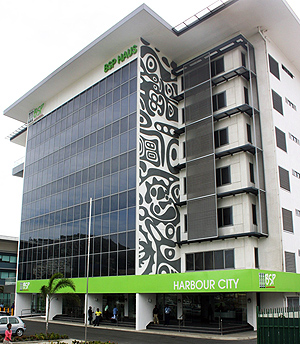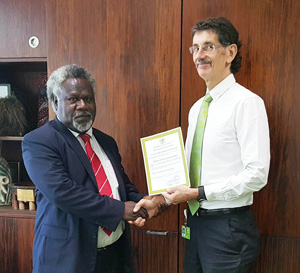Bank South Pacific (BSP) had a strong performance in 2015. It was a bright spot for the Papua New Guinea economy. The Chief Executive of BSP, Robin Fleming, says the bank’s profits have allowed the company to increase its dividend payments, much of which have been ploughed back into PNG’s economy.

BSP Haus in Konedobu
‘BSP, despite challenging economic conditions, reported a record profit of K531.9 million in 2015 for shareholders,’ says Fleming.
‘BSP is confident we will continue to achieve strategic objectives which are directed to continuous improvement of customer service outcomes and achieving growth targets and opportunities aligned to our vision.’
According to BSP’s overview of its 2015 results, the bank has increased net profits after tax by 4.8 per cent to K531.9 million, despite difficult conditions in the PNG economy.
In 2015, the Bank South Pacific Group made dividend payments totaling K369.81 million to shareholders. This meant higher income for PNG’s two biggest superannuation companies, Nambawan Super and NASFUND, both of which are major shareholders in BSP.
Government finances
BSP’s profitability also is a positive for government finances. The bank contributes almost 10 per cent of company tax collections in PNG.
Part of the improvement in profitability has been achieved through efficiency gains. The cost-to-income ratio fell from 47.2 per cent in 2014 to 44.7 per cent in 2015, offsetting the effect of a higher cost of funds, which rose from 0.45 per cent in 2014 to 0.63 per cent in 2015.
‘Customer deposits continue to grow steadily.’
Another factor has been benefits derived from increased scale. BSP has been able to grow both its balance sheet and its business. The Chairman of BSP, Sir Kostas Constantinou, says total assets of the Group increased, by approximately K2.4 billion to K18.196 billion, partially due to the acquisition of Westpac’s Pacific branches in Samoa, Tonga, Cook Islands and the Solomon Islands.’
‘Customer deposits continue to grow steadily—up 11.3 per cent to K14.66 billion, mainly in the retail and government segments in PNG, and in the corporate segment in Fiji,’ says Constantinou. The bank has a 53 per cent market share of PNG’s total banking assets, according to company statements.
Acquisitions

Reserve Bank of Vanuatu Governor Simeon Athy hands over the license for BSP Vanuatu Ltd to BSP Group CEO Robin Fleming. The licence comes into effect on 1 July 2016. Credit: BSP
BSP is pursuing a regional strategy. In 2015, the bank completed the acquisition of Westpac’s operations in the Solomon Islands, Cook Islands, Samoa and Tonga, with approvals also gained for Westpac’s Vanuatu assets. All countries contributed to the strong profit result. BSP’s Fiji operations increased profits by over 25 per cent.
Capital adequacy remains at levels well above regulatory requirements.
In PNG, the bank now has 40 branches, 42 sub-branches and a growing capability in electronic banking.
Capital adequacy remains at levels well above regulatory requirements. Tier 1 capital was 19 per cent, more than double the requirement of the Basel III global standard. Non-performing loans rose from 0.6 per cent in 2015 to 1.7 per cent in 2015.
Provisioning against potential losses has also strengthened, up from 4.6 per cent of loans at the end of 2014 to 4.9 per cent at the end of 2015.








Speak Your Mind